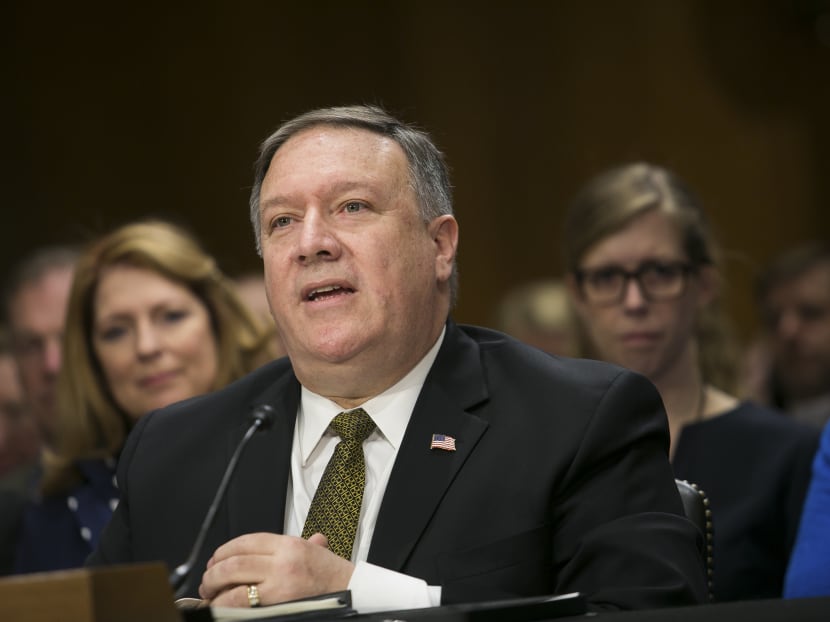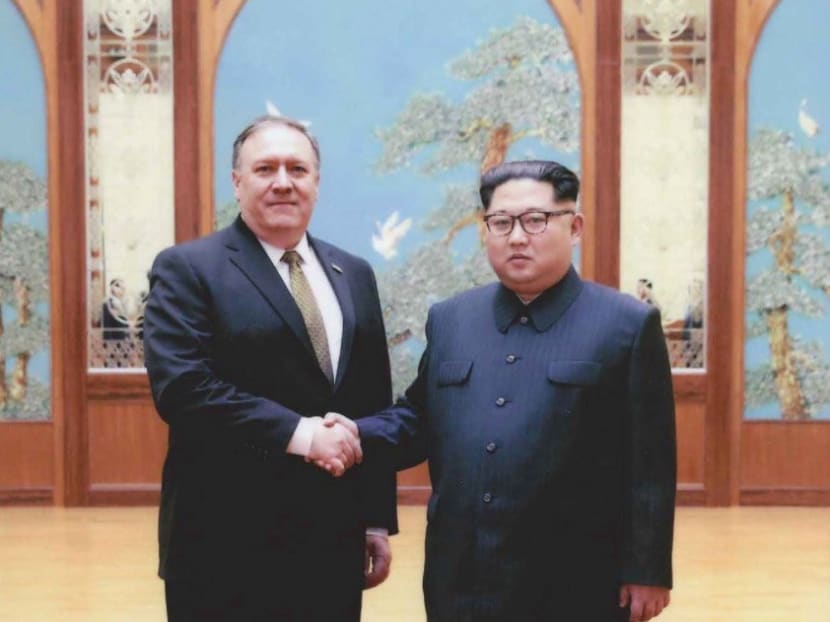Mike Pompeo confirmed as US secretary of state, plans to quickly head to Europe
WASHINGTON — The United States Senate on Thursday (April 27) easily confirmed Mr Mike Pompeo as the nation's 70th secretary of state, elevating the current Central Intelligence Agency director and an outspoken foreign policy hawk to be the nation's top diplomat.

Mike Pompeo, the former director of the CIA, was confirmed as the next secretary of state, after Republican Senator Rand Paul bowed to pressure from President Donald Trump and dropped his opposition.
WASHINGTON — The United States Senate on Thursday (April 27) easily confirmed Mr Mike Pompeo as the nation's 70th secretary of state, elevating the current Central Intelligence Agency (CIA) director and an outspoken foreign policy hawk to be the nation's top diplomat.
In the end, the 57-42 tally lacked the drama of other nail-biting confirmation votes in the Trump era. Earlier this week, Senator Rand Paul, the nominee's main Republican antagonist, bowed to pressure from President Donald Trump to drop his objections.
Ultimately, seven members of the Senate Democratic caucus — five of whom face re-election this year in states that Mr Trump won in 2016 — joined a united Republican conference to support Mr Pompeo's confirmation.
Mr Pompeo was expected to be sworn in almost immediately after the vote, after which he planned to dash to Joint Base Andrews, where a plane was waiting to fly him to Brussels on his first trip abroad as secretary of state for a meeting of Nato allies.
His agenda is already packed, with crucial deadlines in the coming weeks involving Russia, North Korea, Syria and Venezuela.
And he must face these challenges while trying to a repair a State Department damaged under the tenure of his predecessor Rex Tillerson, and with crucial alliances frayed during the Trump presidency.
Senators were mindful of the need to get Mr Pompeo in place, given the crush of work facing him. His confirmation seemed all but assured after Democratic Senator Heidi Heitkamp, who is running for re-election in a state Mr Trump won by a wide margin, said last week that she would support him.
Four other Democrats who are also running for re-election in states won by Mr Trump — Senators Joe Donnelly of Indiana, Joe Manchin of West Virginia, Claire McCaskill of Missouri and Bill Nelson of Florida — also voted to confirm Mr Pompeo.
A vote against Mr Pompeo could have exposed them to attacks from Republicans, including Mr Trump, eager to label them obstructionists.
Mr Pompeo also managed to avoid what would have been an embarrassing rebuke on his way into the new post, as the Senate Foreign Relations Committee had seemed likely to not recommend his confirmation.
But Sen Paul, an outspoken foe of interventionist foreign policy, relented just before the committee's vote Monday.
As secretary of state, Mr Pompeo will also have to navigate the rivalries within the Trump administration. At the White House, Mr John Bolton, the administration's third national security adviser in a little more than a year, is presiding over another purge of top assistants.
Mr Pompeo must forge a working relationship with Mr Bolton as he creates alliances with White House chief of staff John Kelly; Defence Secretary Jim Mattis; and the President's son-in-law and top adviser Jared Kushner.
Mr Pompeo's early military career — he attended West Point and became a tank commander before leaving for Harvard Law School —could endear him to Mr Kelly and Mr Mattis, both former four-star generals.
But handling Mr Kushner will be a delicate matter. Mr Kushner's diplomatic portfolio includes forging a Middle East peace deal and safeguarding the relationship with Mexico even as Mr Trump pursues his hard-line immigration policies and a wall on the southern border.
Mr Pompeo will also have to mend fences with the US Ambassador to the United Nations Nikki Haley, whose relationship with Mr Tillerson was so strained that she ordered his portrait removed from her New York offices.
She was absent from this week's state dinner with French President Emmanuel Macron.
Mr Pompeo's year of service as the director of the CIA has given him a running start. He forged an unlikely bond with Mr Trump while giving the President daily intelligence briefings.

The trust between them is so strong that Mr Trump sent Mr Pompeo to Pyongyang, North Korea, last month on a secret trip to pave the way for a high-stakes summit with North Korean leader Kim Jong-un, now expected to take place in June.
But first, Mr Pompeo must deal with Russia.
Within hours of his landing in Europe, he will preside over a breakfast meeting at Nato headquarters to discuss new measures to counter an increasingly aggressive Russian President Vladimir Putin, who US intelligence officials say has ordered the annexation of Crimea; intervention in Ukraine; the hacking of the 2016 presidential election; and murders or attempted murders of countless rivals, including a former Russian spy living in Britain.
He has maintained his military and diplomatic support for Syrian President Bashar Assad despite the massacre of civilians and the use of chemical weapons.
The gathering will thrust Mr Pompeo into the core contradiction of the Trump presidency, which is staffed with hawks pushing for an increasingly tough line against Moscow but is headed by a president who hopes for improving ties while facing an investigation by special counsel Robert Mueller into whether his campaign colluded with Russia during the 2016 election campaign.
In two weeks, Mr Trump is also set to announce whether he will exit the Iran nuclear deal, struck by then President Barack Obama and the leaders of Russia, Britain, France, Germany and China. Leaving the deal would further fray ties with Europe, but failing to scrap the deal would violate a core campaign pledge.
Mr Pompeo was once a voluble member of the Republican chorus opposing the pact. But in his confirmation hearing, Mr Pompeo promised to try to preserve the accord, one of several pledges he made that were at odds with his record as a four-term Tea Party congressman from Kansas.
This week, Mr Trump also signalled he may preserve the deal.
In addition, Mr Pompeo will have to help forge a strategy to deal with a splintering Syria, something administration officials have openly acknowledged they lack; decide whether to launch a trade war with China; and choose whether to impose new sanctions against Venezuela following the expected re-election of President Nicolas Maduro on May 20 in a campaign widely seen as undemocratic.
Although a decided hawk and more socially conservative than much of his staff, Mr Pompeo's expected arrival has been greeted with quiet relief in Foggy Bottom, which has yet to recover from the tenure of Mr Tillerson, who spent US$12 million (S$15.94 million) on a corporate-style downsizing that drove away many of the nation's diplomats and left behind a demoralised and disorganised staff. THE NEW YORK TIMES






